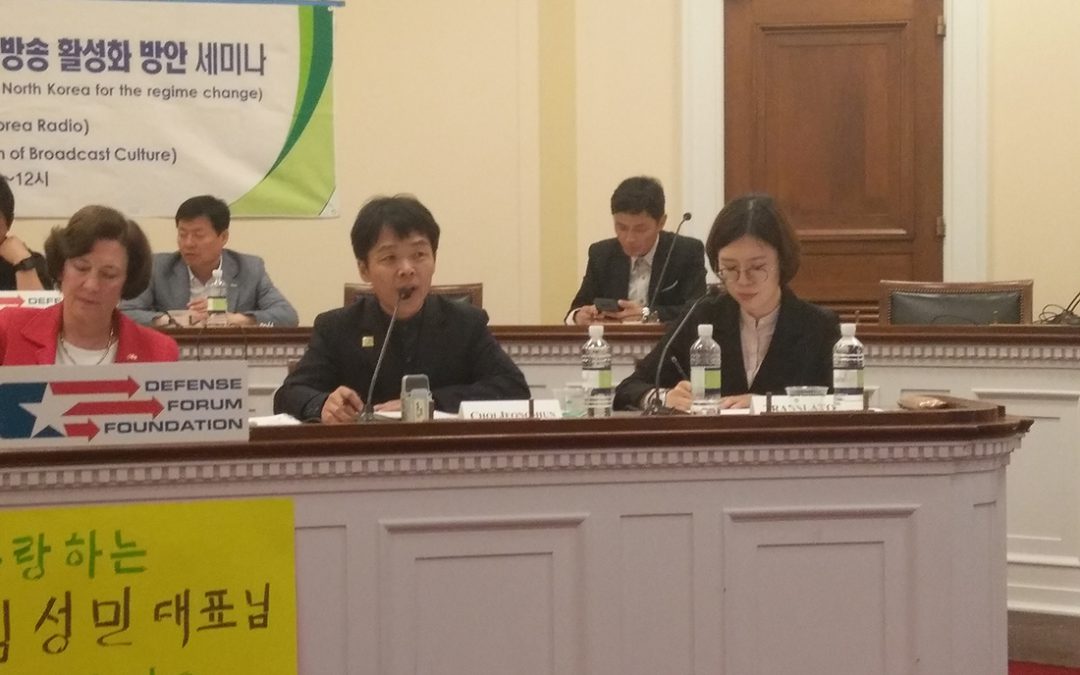WASHINGTON-Cha Ri-hyuk, who defected from North Korea in 2013, still remembers what it was like after his country’s supreme leader, Kim Jong-il, died in 2011.
Trains stopped running, customers were kicked out of hotels and the price of a kilogram of rice [2.2 pounds] soared from 5,000 North Korean Won to more than 30,000 Won, said Cha, a former North Korea artillery corps officer. After managing to buy and cook a kilogram of rice for the women and children in his friend’s family, Cha and his friend survived for three days on nothing but 10 litres – more than four gallons – of potent North Korean alcohol.
“There were many people like us who were drunk during the period and they were covering their faces with newspapers with the news of Kim Jung-il’s death, pretending they are mourning,” Cha told listeners April 28 at a forum about regime change sponsored by the Defense Forum Foundation. “If they were found to be drunk during the period, they would be sent to the political prison.”
What’s striking to Cha is the difference between how people were mourning for Kim Jong-il compared to how they mourned for his father, Kim Il-sung, who died in 1994. “People were really mourning for Kim Il-sung as if he was their own father.”
Cha joined 11 other defectors at the forum to discuss weakening the North Korean regime by informing ordinary North Koreans of its realities. He and others pointed out that the difference in mood among North Koreans could eventually be a key to dealing with the current North Korean regime, led by Kim Jong-il’s youngest son, Kim Jong-un. Hope for change resides with possible future resistance from North Korean citizens and the military, rather than military threats from the President Donald Trump’s administration, Cha said.
“Kim [Jong-un] is not afraid of Trump, because he has China,” said Lim Hye-jin, who served seven years as a communication operator in the North Korea military and managed to escape to South Korea in 2001. Cha agreed, adding: “Kim is afraid of the North Korean people.”
Kim Jong-un is not likely to bow down to any U.S. pressure unless he has a face-saving way to do so, Michael Marshall, director of research and publications at the non-profit Global Peace Foundation, said in a telephone interview after the forum.
Kim Yonho, a senior researcher at the U.S.-Korea Institute of the Paul H. Nitze School of Advanced International Studies at John Hopkins University, said that while long-term change will come from inside North Korea, the United States still needs to negotiate with Kim Jong-un to contain North Korea’s nuclear and missile program.
“The U.S. strategy is high pressure, high engagement. We are now at the high pressure phase, and needs to shift towards the high engagement phase,” he said, adding that he is unsure of when or how the shift could happen.
Meanwhile, change has already been happening in North Korea, the defectors said, speaking from their personal experiences and what they have since learned from their North Korean relatives. Marketplaces have sprung up and have survived in cities and villages despite official disapproval after the collapse of the Public Distribution System in the mid-1990s. North Koreans, the academics and defectors said, are now able to exchange information about the realities of the outside world in those markets.
“People sit around and whisper,” Cha explained in an interview.
While the economy in North Korea remains generally state-controlled, people sometimes are able to engage in private transactions. Kim Yonho said in an interview that this has changed the way people think about the role of the North Korean state. He said that some defectors told him last year that people in North Korea increasingly prefer to make money on their own, rather than having their hands tied by state economy, even with the state provides free services to them.
Meanwhile, the state maintains tight control over official media, and North Koreans have to get information through alternative means, including calling relatives in South Korea using smuggled South Korean phones, said Lim.
Some of the defectors at the forum work with Free North Korea Radio, one of three private radio stations in South Korea aiming to inform North Koreans across the border. Others said they had distributed fliers in North Korea using balloons, or smuggled computer flash drives into the country containing information about the outside world.
“What liars fear the most is the truth,” said Park Sang-Hak, an outspoken defector who is called “fireball” in the defector community. “And Kim Jong-un is the biggest liar of all.”


